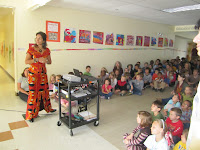Sitting down to write this last story about wrapping up my
service in Senegal was hard for many reasons.
Primarily, my last few weeks at site were busy with tying up loose ends,
packing and giving away a bunch of stuff I’d accumulated, introducing my
replacement to his new home and projects, and making my rounds to say goodbye. That was followed by a week in Dakar doing all
of the administrative things necessary to end a government job. Six other volunteers were
doing this at the same time and a handful of others came in to bid us
farewell, so there have been a plethora of social activities this week as well. Unfortunately, all of this running around and communal living has taken its toll, so I’ll be boarding my flight this evening with
a lovely chest cold, as well as several other minor bacterial infections that were
identified in my last medical exam. I consider
this nice little going away present.
Merci, Senegal. Things could be
worse; there’s a letter I’m bringing to my doctor back home that was included
with all of the final paperwork I received from Peace Corps that outlines of
all of the nasty things that I could have caught while here. Oh joy!
Let’s all cross our collective fingers in hopes that none of these pop
up after my return.
If the volunteer should present herself for treatment, please be aware
that the following diseases are endemic in Senegal:
·
Malaria-falciparum,
ovale, vivax
·
Tropical eosinophilia
·
Infectious
hepatitis
·
Intestinal
parasites (such as Shistosoma, hematobium and S. mansoni, Ancylostoma,
Stongyloma, Ascaris, Trichiura, Taenia, Entamoeba, Histolytica, Giardia
lamblia)
·
Tuberculosis
·
Yaws
·
Leprosy
·
Typhoid
Fever
·
Poliomyelitis
·
Yellow
Fever, Dengue Fever, and other Arbovirus diseases
 |
| Blister beetle burns - ouch! |
Infections aside, as I look back on my two years of service, I'm happy with my accomplishments. I’ve done work that I can be proud of, left a lasting impression on many people, and experienced remarkable personal growth. Some amazing people have entered my life and many existing relationships have been strengthened. My ability to stay connected while I was here was an unexpected blessing and I am thankful to have received so much support and encouragement during this journey.
 |
| Baol Environment board members wishing me farewell |
Leaving site was a bit more difficult than I had
imagined. Three months ago, when we had
our official Close of Service conference, I felt like I already had one foot out the
door. I’d been researching housing,
school, and work options back home and I was mentally ready to leave. As the time drew nearer, however, I really
started to drag my feet. Uprooting your life is never easy, even if you know you're going home. Luckily, I was involved
with training the new group of volunteers who will be replacing many
of us at our sites and this kept me busy until the very last week. During this time, my neighbors and friends stopped by to say goodbye which often turned into lengthy visits. Some of my favorite students,
who didn’t want our lessons to end, made frequent appearances just to hang out. Packing was a production, mostly because I left a lot of things behind and these had to be distributed with great
care so that no one felt left out. I ended up giving all of the clothes I left
behind to the family that I’d eaten lunch with my first year in Diourbel. I felt a tad guilty, as I didn’t have any
clothes for the many boys in the family, but that guilt soon passed when I saw one of
their teenage sons walking down the street in my purple cargo
pants. I wish I’d taken a picture because they looked really cute on him.
 |
| Marame Gueye sorting through my clothes |
 |
| Last photo-op with Ibou |
Last Friday, I joined a group of friends at a local bar near
the University of Dakar to watch the Opening Ceremony of the Olympics. I come from a family of
non-sporty types who can go two years without watching any sports on TV, but when it comes to the Olympics, we're glued to the tube. I was really excited to
be in the capital this last week so I could see some of the coverage. It was fun to sit amongst such an
international crowd, especially during the parade of athletes. People cheered for all of the West African
nations but when the Senegal team hit the
track in their bright yellow boubous, the place erupted with excitement. The same held true when the U.S. team entered the scene. This camaraderie bring people together in a way that you only see when living abroad. Within our Peace Corps community, we have
many people with allegiances to other countries and/or dual citizenship, so there was a rolling
celebration as the teams rounded the track.
 |
| Team Senegal hits the track |
 |
| Alex cheers for her homeland - Poland |
 |
| The Opening Ceremonies |
 |
| Team USA |
I’m looking forward to spending some quality face time with
friends and family over the next few months as I settle back into the swing of
things. Hopefully no one in the fast
lane will run me over before I get a chance to acclimate to the speed of
America. After a week in the DC area, I’ll
be returning to Charlottesville to begin anew.
I’ve rented a cute little house downtown and have enrolled in a
Non-Profit Management certificate program at UVA. I’m excited to get involved with many of the socially conscious
organizations that have sprung up in Charlottesville since I left in 2010, most notably The CvilleTime Bank and the Charlottesville Cash Mob. I’m also looking forward to joining the board of Better World Betty,
a non-profit organization that serves as a resource for sustainable living. We'll be working together to review and refine their mission, goals, and projects There’s a lot of good stuff happening back
home and Charlottesville is filled with some amazing people!
Speaking of amazing people, my friends at Brothers Cycling for the World who helped fund
a village garden project that I worked on with Baol Environment have recently
posted an article I wrote on their website:
http://brotherscycling.com/web/2012/06/celebrating-world-environment-day-baol-environment/
So, in less than 12 hours I'll be boarding my plane to fly home. I leave behind many friends and co-workers who I'll miss dearly, but I have faith that many of our paths will cross again. I take with me a belief that one person can make difference in the lives of others and a new-found courage that will make entering this next phase of life a little easier.
So, in less than 12 hours I'll be boarding my plane to fly home. I leave behind many friends and co-workers who I'll miss dearly, but I have faith that many of our paths will cross again. I take with me a belief that one person can make difference in the lives of others and a new-found courage that will make entering this next phase of life a little easier.
 |
| BAM! |


.png)
.png)
.png)
.png)
.png)


































